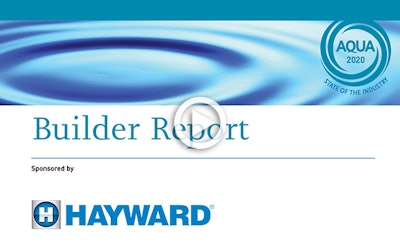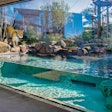The storyline for the pool and spa design and construction community in 2019 had a familiar refrain: lots of work and too few people to do it. Both anecdotally and according to survey respondents, the labor shortage had a chilling effect on what was otherwise a remarkably robust part of the pool and spa marketplace.
We targeted the labor/ employment market with a number of questions in the 2020 State of the Industry Builders Survey, with a view to understanding the specific challenges of attracting and developing talent within the industry. It has been a vexing problem. When it comes to finding qualified new hires, 52% said they still rely on personal references.
On the plus side, builders remain steadfastly optimistic about the market with approximately 85% saying that the industry was still hot last year (58%) or about the same as the year before (27%). As of this early spring, before the COVID-19 crisis, only 12% of respondents said they were cautious about the future of the building sector.
Industry Spotlight: Hayward Pool ProductsThe pool industry is about to undergo a major transformation with the adoption of new pump regulations from the Department of Energy in July of next year. Scott Petty, global product manager, pumps, Hayward Pool Products, is an expert on the subject and has been educating the industry on this historic transition to more energy efficient pumps. AQUA: Do you think builders, service professionals and retailers can gain a business advantage by being proactive in compliance with the July 2021 DOE pump regulations? Scott Petty, Hayward Pool Products: Definitely. Selling DOE-compliant pumps — many of which will be variable-speed models — is a win-win scenario for pool professionals and consumers. When it comes to selling compliant variable-speed models, pool pros will benefit financially because of their higher price point, while consumers will save energy and money from the increased efficiency — plus, they'll enjoy other benefits like noticeably quieter operation, too. Compliance with the new DOE regulations is mandatory, so it's beneficial to prepare early and maximize selling opportunities. Because of the new DOE regulations, manufacturers will be required to meet minimum energy-efficiency requirements for every pump they produce. This new method of measuring energy efficiency is based on a pump's weighted energy factor (WEF) — the higher the WEF rating, the more efficient the pump. For the first time, consumers will be able to compare the energy efficiency of a variety of pool pumps (similar to comparing MPG ratings when purchasing a new car), helping them make better, more educated choices for their pools. Pool pumps manufactured on and after July 19, 2021 will be required to be labeled with their WEF ratings, helping pool pros and pool owners more easily evaluate and compare energy efficiency across models and brands. Builders, service professionals and retailers can gain yet another advantage by being proactive in educating their customers about new compliance standards and WEF ratings. This helps consumers learn how to choose more efficient pumps, ultimately lowering their energy costs and utility bills. AQUA: What is Hayward doing to help prepare the industry for DOE implementation in July 2021? SP: First and foremost, Hayward is helping the industry prepare by offering the broadest range of DOE-compliant pool pumps — including a variety of single-speed options. Contrary to some industry misconceptions, many Hayward single-speed pumps will be DOE-compliant and will continue to be manufactured and sold. More specifically, Hayward Super Pump and MaxFlo XL single-speed pumps 1 HP and lower will meet the new DOE energy-efficiency standards and will be fully compliant. Hayward is also helping the industry stay ahead of the curve by designing product solutions that far exceed the new efficiency requirements. For example, all Hayward variable-speed pumps already pass the most stringent ENERGY STAR 3.0 standards. Plus, Hayward's portfolio of pumps has some of the best weighted energy factor (WEF) ratings in the industry, and our variable-speed pumps (higher than 1 HP) are the most energy efficient on the market. However, we understand this only matters if pool pros and consumers understand what WEF is and why it's important when choosing a pump — which is why we're also focusing heavily on education. Hayward has taken a leadership approach to the DOE regulatory changes and is working to educate both the trade and homeowners on what it means for them. By diving into new terms and concepts, explaining what they mean and why they're important, we're helping the trade make informed decisions about their businesses and helping homeowners make the best decisions for their pools. Hayward recently launched a dedicated DOE Resource Center at hayward.com/regulations that's loaded with fact sheets, FAQs, videos, infographics, blog articles, whitepapers, recorded webinars, trade show class training sessions and more. This site will be updated regularly with key DOE updates, important news and other useful resources for continued help on navigating the upcoming changes. We've also created a dedicated email address for questions on the regulations, so it's easy to get in touch with our experts: just send an email to [email protected]. AQUA: As we saw with VGB, there will likely be companies that will put off changing their practices until the new DOE regs take effect. What are the downsides of not preparing your business for this new law? SP: The key risk of pool pros not preparing their businesses is the uncertainty of exactly when non-compliant pool pumps will no longer be available in specific regions and territories. While inventory of non-compliant pumps will not have to be returned or exchanged after July 2021 and will still be available while supplies last, businesses that don't take steps to change their practices in advance may find themselves with little to no time to transition to compliant pump models, jeopardizing their selling opportunities. In the eyes of their customers, there's also a competitive risk of being left behind by not keeping up with the latest industry technologies. The new DOE regulations will significantly increase awareness of and preference for variable-speed pumps, and failing to appropriately prepare for the regulations may put companies at a distinct competitive disadvantage. |













































